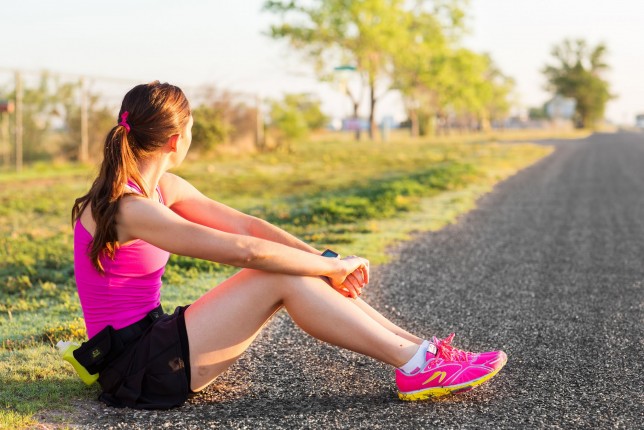Addiction to Exercise is a real thing. Especially in today’s social media world with all of it’s fitness posts— fit bodies with little to no fat on them. It is important to be aware of the danger that lies behind exercise addiction.How do you know when enough is enough? When is your exercise taking over your life and becoming an addiction? There is no one better person to share the dangers of exercise addiction than my wonderful sister-in-law Courtney.
Courtney is well versed in all things health, nutrition, and exercise. Without saying too much about her story— I’ll let her tell it— But you must know, there isn’t a better person in this world. What she has to say is a real life lesson for all of us, including steps to know for yourself if you are addicted to exercise. You can read more about Courtney and her journey at courtneysrecovery.blogspot.com.
Take it away Courtney!
The Balancing Act
I have struggled with an eating disorder that has taken over and nearly destroyed my life for over two decades. When I honestly look at what started this downward spiral into hell, it all began with an addiction to exercise. I started swim team at age 8 and probably because of my body type (I wasn’t fat but I wasn’t stick thin) and genetics I wasn’t as fast as the other girls. This really ate away at my self-confidence. I would cry after swim meets because I was always coming in 5th or 6th (out of 6) while my friends were always getting the blue ribbons. But even though I wasn’t fast I pushed myself as much as I could. It was discouraging to swim so hard for two hours each morning that I could barely breathe, only to once again come in last at the next meet. Around age 10 I started thinking that maybe if I did more exercise at home my swimming would improve, so after practice I would go into my room and do push-ups, sit-ups, and other exercises. But it didn’t make a difference, I was still slow.
When I was 12 someone suggested that maybe I could improve my swimming if I started running and lost a little of my puberty weight. And this is where my addiction to exercise truly began. Running made me feel like I was free. I wasn’t particularly fast, but I could run long distances. I still remember the feeling of completing my first 5K, my first 10K, my first half-marathon, and then my first full marathon when I was 17. Finally, I could do something that not everyone could do. I mean what junior in high school gets up at 5:00 am so they can go on a 20 mile training run?
There is nothing wrong with running, but I took it to such an extreme that I couldn’t miss a day. Running for 3-4 hours wasn’t enough–right after my runs I’d escape to my room and exercise even more. In between my junior and senior years of high school I started drastically restricting my intake and I lost a lot of weight. You’d think losing weight would’ve helped me feel better about myself and my body but in fact the opposite was true. Yes, I was thrilled that the number on the scale kept dropping and that I could fit into smaller clothes, but I became so distorted that even when all I was pinching was skin I was convinced that I had more weight to lose.
When I went to college I spent all my time running and studying–I had no social life, my health was rapidly declining, and yet I was in complete denial and refused to believe I had a problem. And although I finally reached a point where I could no longer pretend things were ok, no amount of support was ever enough to pull me out of my destructive habits. I still remember the day this picture was taken at a family birthday party:
I was too weak to run at the time, but because I had allowed myself to eat a piece of chicken, some salad and fruit, and a few bites of cake and ice cream without purging I had to go home and walk for hours to make up for the “damage” I’d done.
To recount 23 years of struggle, even just with exercise, would turn this into a 500 page novel so I’ll spare you the gruesome details and just say I never understood what a healthy balance with exercise would look like. Because of injuries and exhaustion, I went through periods where I hardly exercised at all because I was so depleted from restricting and purging that I had no energy left to physically exert myself.
I didn’t stay sick because I wasn’t trying to get better. I went to treatment over and over again, tried to gain weight using an NG tube at home, had my family or even people we hired monitor me every minute of the day–in many ways I felt like I had exhausted every avenue of hope. I’m not going to get into the details of why I didn’t recover, what I was doing that held myself back or what things were going on in my brain physiologically that made it so difficult for me to move forward. This post is already getting way too long for all of that. I’m going to skip forward to what I’m doing today. Like I’ve explained in my posts from earlier this week, I finally decided I needed long term treatment. Short term treatment stays didn’t work for me–a few months may be long enough to restore weight but in my case it wasn’t enough time to make changes in my brain that would actually help me sustain change. It’s embarrassing to admit that I’ve been in treatment for almost 16 months but I also never imagined I could be where I am today.
Here at Avalon we actually get more exercise than at any other treatment center I’ve been to. We do yoga, strength training, self-defense, walks, zumba, and on the weekends we’ll rotate activities like swimming, basketball, volleyball, tennis, I think they may even try rock climbing sometime soon. And every so often we have bigger outings where we’ll go downhill or x-country skiing, canoeing, hiking, snow shoeing, sledding, etc. When I was in residential treatment living at Avalon 24/7 I was able to find a pretty balanced relationship with exercise. But at the end of January of this year I transitioned to the day patient program where I go home evenings and weekends and the added independence has made me realize I still have some pretty big weak spots.
When you have both healthy and unhealthy intentions competing it can be difficult to tease out whether exercise is balanced or not. Since I’ve moved to day patient I’ve been able to add a few more exercise classes throughout the week, however pretty quickly I have found that the extra exercise was actually making me crave more and more. I started sneaking in quick bouts of exercise any time I had a free minute at home or scheduling my time off so I could go on an extra run or do an intense workout video. It’s normal (and healthy) to increase your activity level when transitioning from residential treatment (where you spend most of the day sitting on a couch) to real life, but it’s hard to navigate that territory. Even if the amount of time I was exercising wasn’t unreasonable for a healthy adult, my mindset was dangerous. And feeding those compulsive exercise thoughts led to more obsession with my body, which then led to cutting corners with my eating and there I was standing back on the slippery slope.
The other day I wrote out a list of questions I can ask myself to identify if my relationship with exercise is healthy. Exercise addiction is a tricky subject because we live in a society that praises people with ripped bodies, applauds extreme forms of exercise, and in many ways convinces us we’re weak and lazy if we’re not in perfect shape. I don’t think we have the ability to judge anyone else on whether or not they are healthy–just because someone is in fabulous shape doesn’t mean they have an addiction and someone who may appear overweight by societies standards could desperately need help. The only one who can truly judge where we lie on this spectrum is ourselves. This is a list of questions I came up with based off of my own struggles, so you may want to look at your own life and ask yourself if there are different questions you need to add to your own list.
How do I know if my exercise is healthy and balanced?
1- If I can’t exercise, is my day ruined?
- Am I so dependent on those endorphins that I haven’t developed other healthy coping skills?
- Do I rely on my exercise to provide feelings of accomplishment, self-worth, and a sense of identity? (some of this is ok but too much dependency can be dangerous)
- Does my daily schedule revolve around my exercise?
2- If I’m not able to exercise, do I have to cut back on what I eat?
- Yes, when we are less active then sometimes our energy requirements for the day go down. But our bodies don’t operate on a perfect 24 hour clock. Many times I am actually hungrier a day or two after a hard workout, even if I haven’t exercised that day.
- Some of us may be out of touch with our hunger/fullness cues but we can still work towards trusting that our body will tell us what it needs. For my first year in treatment I rarely felt any hunger so I had to eat based off of a meal plan, but as my body is learning to trust me again I am learning to listen for my hunger cues and respect them.
- Sometimes it’s scary to honor our hunger, especially if we think we’ve already eaten enough for a meal, snack, or day. But we have to remember that our physical needs fluctuate day to day for a variety of reasons, independent of exercise. So we don’t need to drastically change what we eat just because we miss a workout. Sure, if we are injured or making a significant change to our exercise regimen we may need to modify our intake, but don’t let yourself fall into the trap of thinking “I can only eat X because I exercised”.
3- Am I making exercise a higher priority than what my heart truly values?
- Am I missing out on time with the people I love? How does my exercise impact my husband, kids, or friends? Am I an example to them of balanced living or do they see me put too much emphasis on my body? Would I want them doing what I am doing?
- Am I focusing on other life goals and character development or am I simply focused on my fitness goals?
- Am I putting exercise above things that matter more?
4- Am I becoming overly obsessed with my body?
- Am I constantly body checking, trying to figure out if I’ve lost weight or body fat? Am I obsessed with being toned?
- Exercise should be about health and physical and emotional wellness, not about sculpting the perfect body
- Ask yourself these questions: Why do I want a different body? How will looking more “fit” change my self-worth? If I think people will like me more if I lose X pounds, are those really the type of people I want in my life?
- When living a healthy lifestyle–eating balanced and following a regular exercise routine–your body will naturally settle where it wants to be. That may include losing weight (or gaining for some) and it’s ok to be excited about your body changing in a way that makes you feel better. There is nothing intrinsically bad about losing weight or getting fit. The problem is when we become so obsessed with it and take it to such an extreme that it controls our life.
5- Am I exercising to the point of injury and/or continuing to exercise when injured, sick, overly fatigued, or when my body is just telling me “no”?
- An injury does not mean you have an exercise addiction, but it can be our body’s way of telling us that something is not right
- I have had chronic hip and IT band problems and I used to go on running by popping a bunch of IBuprofen and running through the pain. Because of that I have done damage to my body that may be permanent. It’s not worth it!
- Can we take “rest days” even if they’re not scheduled? And be ok with taking weeks, or even months, off if our body needs time to heal?
- Once again, we need to make sure exercise isn’t the only way we can cope with the stress of life. Taking a break, even if we’re not injured, can be an indicator of whether or not we have a variety of coping skills.
6- Am I keeping exercise fun?
- Everyone enjoys different types of exercise–for one person running marathons is pure bliss whereas someone else would rather die than run a mile
- Exercise is hard work so it’s normal to sometimes feel unmotivated to get moving, but once you’re going do you enjoy it? Or are you miserable the whole time, counting down the minutes until you are done?
- I know for myself I like to mix it up–I still enjoy running but I also like HIIT, pilates, weights, hikes, yoga, Zumba, playing soccer with my family–if I do too much of one thing I get sick of it.
- Because I overdid it with running for years I am scarred by my miserable 3-4 hour runs on a treadmill. Every so often I’ll do a short walk or run on the treadmill but after about 30 minutes it starts to feel like torture and I have to hop off. But take me to the mountains and I could hike for hours without losing that high I feel when I’m in the “zone”.
7- What is my mindset when I’m exercising?
- Am I fixated on calories burned or pounds lifted or number of reps?
- Am I present and connected with my body or am I so zoned out that I’m exercising like a robot?
- Yoga is hard for me because the slower pace allows my thoughts to spin and it makes me more aware of my body (which I usually try to avoid at all costs!). But mindful exercise helps us center and ground ourselves and is a really effective way to improve mental health.
This is not a complete list, but these are some ideas that I want to use to help me find a way to incorporate the magnificent gift of exercise into my life without it taking over. Right now I’m really challenging myself to do less physical activity until I can approach it with a better mindset. And you know what? I haven’t magically gained 10 pounds in a week because I’ve been less active. My muscles are not atrophying before my eyes. And even if I do gain a couple pounds, why would that matter? I believe I am a daughter of God and that is the identity I want to strengthen and focus on. But I also want to be able to climb mountains when I’m 80 years old and I believe with patience and faith it is possible to find our own unique balance. What works for me will look different from what works for you. But that’s ok. What matters is that we are honest with ourselves and that we move towards what brings our heart true, lasting joy.
Now this is how exercise should be done!
(hiking Donut Falls with the fam)
Share This:



